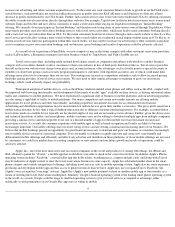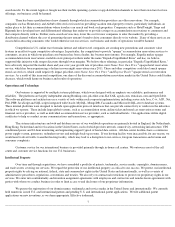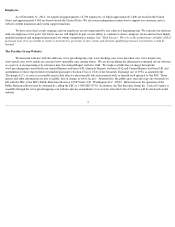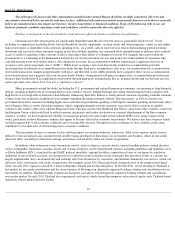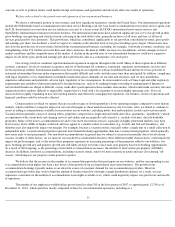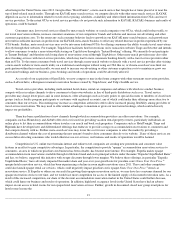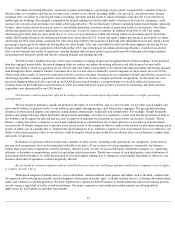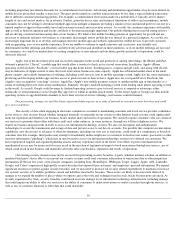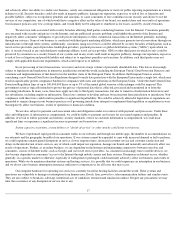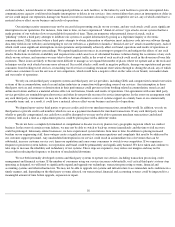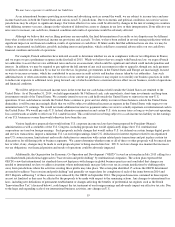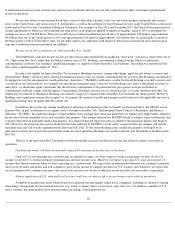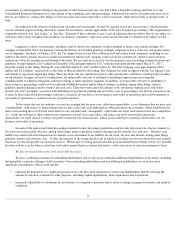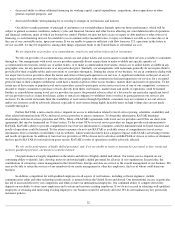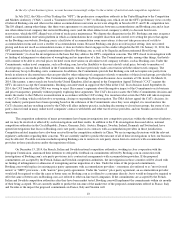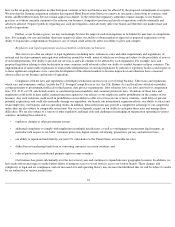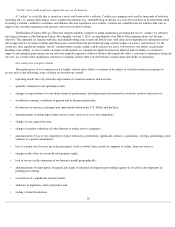Priceline 2014 Annual Report Download - page 20
Download and view the complete annual report
Please find page 20 of the 2014 Priceline annual report below. You can navigate through the pages in the report by either clicking on the pages listed below, or by using the keyword search tool below to find specific information within the annual report.
including proprietary last-minute discounts for accommodation reservations. Advertising and distribution opportunities may be more limited on
mobile devices given their smaller screen sizes. The gross profit earned on a mobile transaction may be less than a typical desktop transaction
due to different consumer purchasing patterns. For example, accommodation reservations made on a mobile device typically are for shorter
lengths of stay and are not made as far in advance. Further, given the device sizes and technical limitations of tablets and smartphones, mobile
consumers may not be willing to download multiple apps from multiple companies providing a similar service and instead prefer to use one or a
limited number of apps for their mobile travel and restaurant research and reservation activity. As a result, the consumer experience with mobile
apps as well as brand recognition and loyalty are likely to become increasingly important. Our mobile offerings have received strong reviews
and are driving a material and increasing share of our business. We believe that mobile bookings present an opportunity for growth and are
necessary to maintain and grow our business as consumers increasingly turn to mobile devices instead of a personal computer. As a result, it is
increasingly important for us to develop and maintain effective mobile apps and websites optimized for mobile devices to provide customers
with an appealing, easy-to-use mobile experience. If we are unable to continue to rapidly innovate and create new, user-friendly and
differentiated mobile offerings and efficiently and effectively advertise and distribute on these platforms, or if our mobile offerings are not used
by consumers, we could lose market share to existing competitors or new entrants and our future growth and results of operations could be
adversely affected.
Apple, one of the most innovative and successful companies in the world and producer of, among other things, the iPhone and iPad,
obtained a patent for "iTravel," a mobile app that would allow a traveler to check in for a travel reservation. In addition, Apple's iPhone
operating system includes "Passbook," a virtual wallet app that holds tickets, boarding passes, coupons and gift cards, and, along with iTravel,
may be indicative of Apple's intent to enter the travel reservations business in some capacity. Apple has substantial market share in the smart
phone category and controls integration of offerings, including travel services, into its mobile operating system. Apple also has more experience
producing and developing mobile apps and has access to greater resources than we have. Apple may use or expand iTravel, Passbook, Siri
(Apple's voice recognition "concierge" service), Apple Pay (Apple's new mobile payment system) or another mobile app or functionality as a
means of entering the travel reservations marketplace. Similarly, Google's Android operating system is the leading smart phone operating system
in the world. As a result, Google could leverage its Android operating system to give its travel services a competitive advantage, either
technically or with prominence on its Google Play app store or within its mobile search results. To the extent Apple or Google use their mobile
operating systems or app distribution channels to favor their own travel service offerings, our business could be harmed.
Our processing, storage, use and disclosure of personal data exposes us to risks of internal or external security breaches and could
give rise to liabilities.
The security of data when engaging in electronic commerce is essential to maintaining consumer and travel service provider confidence
in our services. Any security breach whether instigated internally or externally on our system or other Internet based systems could significantly
harm our reputation and therefore our business, brand, market share and results of operations. We currently require consumers who use certain of
our services to guarantee their offers with their credit card, either online or, in some instances, through our toll-free telephone service. We
require user names and passwords in order to access our information technology systems. We also use encryption and authentication
technologies to secure the transmission and storage of data and prevent access to our data or accounts. It is possible that computer circumvention
capabilities, new discoveries or advances or other developments, including our own acts or omissions, could result in a compromise or breach of
consumer data. For example, third parties may attempt to fraudulently induce employees or customers to disclose user names, passwords or other
sensitive information ("phishing"), which may in turn be used to access our information technology systems or to defraud our customers. We
have experienced targeted and organized phishing attacks and may experience more in the future. Our efforts to protect information from
unauthorized access may be unsuccessful or may result in the rejection of legitimate attempts to book reservations through our services, any of
which could result in lost business and materially adversely affect our business, reputation and results of operations.
Our existing security measures may not be successful in preventing security breaches. A party (whether internal, external, an affiliate or
unrelated third party) that is able to circumvent our security systems could steal consumer information or transaction data or other proprietary
information. In the last few years, several major companies, including Sony, HomeDepot, JPMorgan, Target, Zappos, Apple, AOL, LinkedIn,
Google, and Yahoo! experienced high-profile security breaches that exposed their customers' and employees' personal information. We expend
significant resources to protect against security breaches, and we may need to increase our security related expenditures to maintain or increase
our systems' security or to address problems caused and liabilities incurred by breaches. These issues are likely to become more difficult to
manage as we expand the number of places where we operate and as the tools and techniques used in such attacks become more advanced. As
recently experienced by Sony, security breaches could result in severe damage to our information technology infrastructure, including damage
that could impair our ability to offer our services or the ability of consumers to make reservations or conduct searches through our services, as
well as loss of customer, financial or other data that could materially
16


